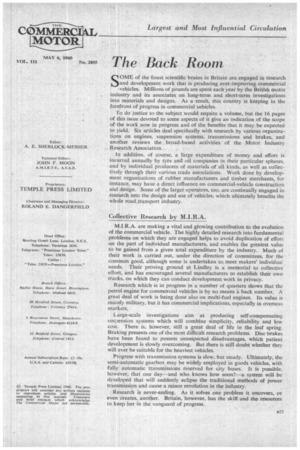Collective Research by M.I.R.A.
Page 65

If you've noticed an error in this article please click here to report it so we can fix it.
NI.I.R.A. are making a vital and growing contribution to the evolution of the commercial vehicle. The highly detailed research into fundamental problems on which they are engaged helps to avoid duplication of effort on the part of individual manufacturers, and enables the greatest value to be gained from a given total expenditure by the industry. Much of their work is carried out, under the direction of committees, for the common good, although some is undertaken to, meet makers' individual needs. Their proving ground at Lindley is a memorial to collective effort, and has encouraged several manufacturers to establish their own tracks, on which they can conduct development work in privacy.
Research which is in progress in a number of quarters shows that the petrol engine for commercial vehicles is by no means 1.1 back number. A great deal of work is being done also on multi-fuel engines. Its value is mainly military, but it has commercial implications, especially in overseas markets.
Large-scale investigations aim at producing self-compensating suspension systems which will combine simplicity, reliability and low cost. There is, however, still a great deal of life in the leaf spring. Braking presents one of the most difficult research problems. Disc brakes have been found to possess unsuspected disadvantages, which patient development is slowly overcoming. But there is still doubt whether they will ever be suitable for the heaviest vehicles.
Progress with transmission systems is slow, but steady. Ultimately, the semi-automatic gearbox may be widely employed in goods vehicles, with fully automatic transmissions reserved for city buses. It is possible, however, that one day—and who knows how soon?—a system will be developed that will suddenly eclipse the traditional methods of power transmission and cause a minor revolution in the industry.
Research is never-ending. As it solves one problem it uncovers, or even creates, another. Britain, however, has the skill and the resources to keep her in the vanguard of progress.




































































































































































































































































